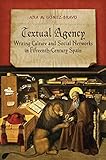Textual Agency : Writing Culture and Social Networks in Fifteenth-Century Spain / Ann M. Gomez-Bravo.
Material type: TextSeries: Toronto IbericPublisher: Toronto : University of Toronto Press, [2013]Copyright date: ©2013Description: 1 online resource (344 p.)Content type:
TextSeries: Toronto IbericPublisher: Toronto : University of Toronto Press, [2013]Copyright date: ©2013Description: 1 online resource (344 p.)Content type: - 9781442647206
- 9781442667518
- Authorship -- Sociological aspects
- Incunabula -- Spain
- Literature and society -- Spain -- History -- 15th century
- Paper
- Paratext -- Spain -- History
- Spanish literature -- To 1500 -- History and criticism
- Transmission of texts -- Spain
- Writing materials and instruments -- History
- LITERARY CRITICISM / Medieval
- 686.2094609/024
- Z173 ǂb .G66 2013eb
- online - DeGruyter
| Item type | Current library | Call number | URL | Status | Notes | Barcode | |
|---|---|---|---|---|---|---|---|
 eBook
eBook
|
Biblioteca "Angelicum" Pont. Univ. S.Tommaso d'Aquino Nuvola online | online - DeGruyter (Browse shelf(Opens below)) | Online access | Not for loan (Accesso limitato) | Accesso per gli utenti autorizzati / Access for authorized users | (dgr)9781442667518 |
Browsing Biblioteca "Angelicum" Pont. Univ. S.Tommaso d'Aquino shelves, Shelving location: Nuvola online Close shelf browser (Hides shelf browser)
restricted access online access with authorization star
http://purl.org/coar/access_right/c_16ec
Textual Agency examines the massive proliferation of poetic texts in fifteenth-century Spain, focusing on the important yet little-known cancionero poetry - the largest poetic corpus of the European Middle Ages. Ana M. Gómez-Bravo situates this cultural production within its social, political, and material contexts. She places the different forms of document production fostered by a shifting political and urban model alongside the rise in literacy and access to reading materials and spaces.At the core of the book lies an examination of both the materials of writing and how human agents used and transformed them, giving way to a textual agency that pertains not only to writers, but to the inscribed paper. Gómez-Bravo also explores how authorial and textual agency were competing forces in the midst of an era marked by the institution of the Inquisition, the advent of the absolutist state, the growth of cities, and the constitution of the Spanish nation.
Mode of access: Internet via World Wide Web.
In English.
Description based on online resource; title from PDF title page (publisher's Web site, viewed 01. Nov 2023)









